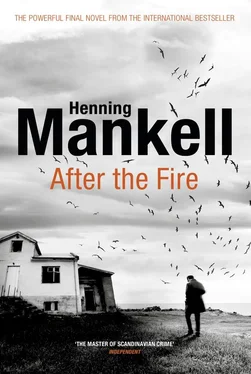It was after one of these conversations with Louise that I remembered an occasion when my father had come staggering home much too early. He was drunk, his hair a mess, and he was furious. The rage was etched on his face, every muscle seemingly set in the throes of an agonising cramp. I could also see the despair in his eyes. I must have been about ten years old at the time. My mother pushed the door to, leaving it open just a fraction. Looking back, I realise she did this so that I would be able to follow what was said, and perhaps so that I would learn how a person could be utterly crushed yet still be open to solace and have the ability to overcome his humiliation.
I couldn’t see much, but I heard every word.
It was the same old story: my father had fallen out with the maître d’ and been fired on the spot. He had thrown his cloth on the floor and simply walked out. The maître d’ had followed him into the street, and they had stood there yelling at one another until there were no words left. It had been raining. They had stood there like two dripping-wet dogs.
My father was often fired under dramatic circumstances. It was by no means unusual to find him sitting at the kitchen table moaning while my mother slowly persuaded him to regain his faith in humanity, and above all in himself. But on this particular evening he said something quite different from the standard litany of complaints about the indignities to which he was constantly subjected.
Earlier in the day, while the restaurant was quiet, he had apparently flicked through a magazine left behind by a customer. He had read about a Chinese emperor who, long long ago, had ordered that a large drum be placed by the main entrance to his palace. Anyone who came along could stop, strike several powerful blows, then pass on their complaint to a servant, who would immediately convey it to the emperor. Everyone had the opportunity to put forward a grievance without the risk of incurring imperial rage.
‘These drums don’t exist anywhere,’ my father fumed. ‘There isn’t a single place where we can wield our drumsticks to make sure that someone listens to all the injustices we have to suffer.’
Why did I think of my father and the emperor’s drum after I had spoken to Louise? There was no connection. A waiter and a pickpocket had nothing in common. The only thing I could come up with was that both of them wanted to live in a different, fairer world where justice applied to everyone.
I jotted down a few words on a scrap of paper.
The emperor’s drum. My father’s tears at the kitchen table. What’s the connection?
The following day when I was in the caravan I heard Jansson’s boat approaching. My heart started racing. I opened the door and listened. There was no doubt: it was definitely Jansson.
He seemed exactly the same as usual. The way he raised his right arm slowly, a little stiffly, before he waved with fingers outspread. He didn’t stop waving until I had returned the gesture. I couldn’t believe he had discovered my secret visit to Stångskär; if he had, he was hiding it very well.
He had run the mooring rope from the prow to the roof of the wheelhouse, and when he reached the jetty he flung it to me. I caught it and looped it around the nearest bollard.
Jansson clambered ashore.
‘My brother was fine,’ he said, perching at the end of the bench. ‘But the trip was a bit longer than I’d planned.’
He took off his left boot and shook out a fragment of a pine cone, then put it on again.
I stood looking at this man, whom I had known for so many years. I realised now that I had known only a small part of a complex, splintered individual. I had never had any suspicion that a terrifying figure was hidden behind the ordinary person who had delivered the post to the island for so long.
Did he himself know who he was? Do any of us really know who we are?
I had no answer. The only thing I was clinging to at the moment was the incomprehensible.
A grey-haired postman who was also a ruthless arsonist.
If the bright light hadn’t woken me, I would have burned to death. The widow Westerfeldt could also have been the victim of the terrifying power of fire. And Jansson had had no way of knowing whether the Valfridssons were out on their island or not.
Standing there in front of the man on the bench, I felt utterly helpless.
‘You don’t usually come over for no reason,’ I said.
‘I just wanted to tell you that my brother is fine, but living in a big city seems like an insecure kind of existence to me.’
‘What do you mean?’
‘How can you keep tabs on yourself when other people are pushing and shoving and bumping into you all the time?’
I was struck by the thought that Jansson might not even have a brother. Could that be as much of a lie as everything else? The man sitting there on the bench had set fire to my house, then invited me to stay with him when my house no longer existed. He had even brought a wellington boot to replace the one I had lost in the fire. He had celebrated New Year’s Eve with me; he had said he was going home to bed, but instead he had set fire to another house. And in between these two incidents he had also burned down the widow Westerfeldt’s home.
I couldn’t put it off any longer. I had to face up to him.
‘Why?’ I said.
Jansson looked at me.
‘Sorry, did you say something to me?’
‘There’s no one else here.’
‘I didn’t quite hear what you said.’
‘Yes, you did.’
Jansson didn’t seem to have any idea that I knew. How could he be so sure that no one had found any evidence? Wasn’t he even on his guard?
‘Coffee would be nice,’ he said abruptly.
During all the years he had been coming to the island, he had never asked for coffee. I wondered if it meant anything. Should I be afraid? If he could burn down a house in which someone lay sleeping, he could whip out a hammer and smash my skull.
We went up to the caravan side by side, Jansson with his usual slightly rolling gait. He sat on the bed while I made coffee. He asked after Louise and Agnes, he talked about Lisa Modin, but when he started enquiring about the plans for the new house, I felt like throwing the boiling water over his face and hands.
I didn’t do it, but I did stop making the coffee.
‘I want you to leave,’ I said. ‘I want you to leave and never show your face here again.’
Jansson looked startled.
‘What do you mean? I don’t understand what you mean.’
I had opened the door, but he was still sitting on the bed as if he really didn’t understand.
Of course he did. He might not have noticed that I had been in his house while he was away visiting someone who might possibly be his brother, but he certainly realised that I knew he was responsible for the arson attacks.
‘You’ve opened the door,’ he said. ‘But I still don’t understand what you want. Are you throwing me out?’
I closed the door. Now I wanted to prevent him from leaving.
Why had he burned down my house when I was lying there fast asleep? Was it me or the house he wanted to destroy? Or was it something else?
‘I know it was you,’ I said. ‘I know, and I can give the police enough information to warrant an investigation, which will see you charged and convicted. I have proof — clothes in your laundry basket, stinking of petrol.
‘I wonder if, deep down, you wanted me to find out the truth. Wasn’t that why you came here to tell me you were going to visit your brother? Who may or may not exist. You hoped I would go over to your island. If you’d really wanted to hide the evidence, you would have washed everything to do with the fires. You’re like one of those criminals who writes letters to the police to give them clues. But who are you?
Читать дальше












